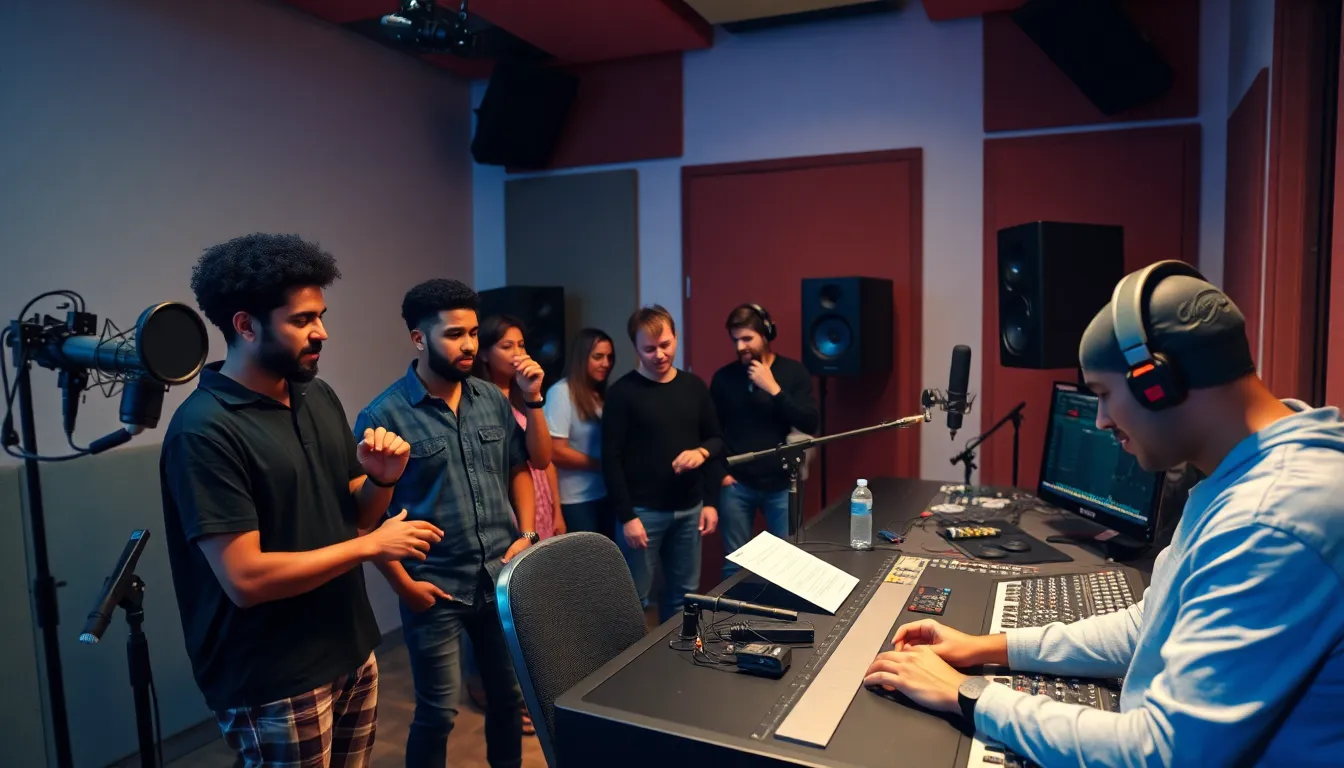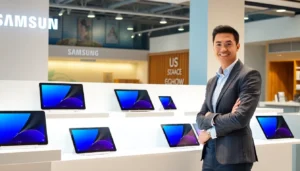In a world where everyone’s a critic and every cat video goes viral, the arts audio/video technology and communications career cluster stands out like a neon sign at a black-and-white film festival. This dynamic field isn’t just about pressing play; it’s about crafting experiences that resonate, entertain, and inform. From the glitz of Hollywood to the buzz of social media, professionals in this cluster wield the power of sound and vision to shape culture.
Table of Contents
ToggleOverview of Arts Audio/Video Technology and Communications Career Cluster
The Arts Audio/Video Technology and Communications career cluster encompasses a wide range of professions that revolve around the production and distribution of audiovisual content. This field plays a crucial role in shaping how information and entertainment reach audiences. Professionals in this sector create innovative media experiences through techniques in sound, video, and digital communication.
Job roles within this cluster include audio engineers, video editors, and digital media designers. Each position requires a unique set of technical skills and creativity. Audio engineers focus on sound production and editing while video editors enhance visual storytelling through post-production techniques. Digital media designers specialize in creating interactive content for various platforms, including websites and mobile applications.
Career opportunities within the Arts Audio/Video Technology and Communications cluster are abundant. According to the Bureau of Labor Statistics, employment for film and video editors is projected to grow by 18% from 2020 to 2030, significantly faster than the average for all occupations. As the demand for high-quality content continues to rise, individuals with expertise in these areas find themselves in high demand.
Training programs in this field are available at various educational institutions, offering hands-on experiences and industry-relevant skills. Technical certifications in software programs, such as Adobe Creative Suite, further augment career prospects. This cluster thrives on innovation, adapting to shifts in technology and viewer preferences.
Networking is essential for success in this competitive environment. Professionals often build connections through internships, industry events, and online platforms to stay updated on trends and job openings. Engaging with peers and mentors fosters collaboration and growth within the field.
Key Components of the Career Cluster

This section covers the primary areas within the Arts Audio/Video Technology and Communications career cluster, focusing on audio, video, and communication technologies.
Audio Technology
Audio technology encompasses a range of roles responsible for recording, mixing, and producing sound. Professionals in this area may work as sound designers, audio engineers, or music producers. Each position requires knowledge of various software and hardware tools, including microphones, mixers, and digital audio workstations. Certifications in programs like Pro Tools and Logic Pro are essential for career advancement. The demand for skilled audio professionals continues to grow, especially in fields such as film, music, and podcasting. In particular, the rise of streaming services has created new opportunities for audio engineers to enhance the listening experience.
Video Technology
Video technology focuses on producing, editing, and distributing visual content for various platforms. Jobs in this sector include roles such as video editors, cinematographers, and motion graphics designers. Mastery of software like Adobe Premiere Pro and Final Cut Pro is critical for success in these positions. High-quality video content is increasingly sought after for entertainment, marketing, and online education. The projected 18% growth among film and video editors by 2030 reflects this demand. Creative storytelling and technical skills play crucial roles in ensuring that video content engages audiences effectively.
Communication Technology
Communication technology emphasizes the transmission of information across diverse media platforms. This includes careers in public relations, social media management, and broadcast journalism. Effective communication strategies rely on understanding audience dynamics and leveraging digital tools. Professionals in this field often utilize analytics software to assess the impact of their communication efforts. The rapid evolution of communication technologies, combined with the growth of online content, creates an evolving landscape for specialists. Networking through internships and industry connections greatly enhances career opportunities in this competitive sector.
Career Pathways and Opportunities
The Arts Audio/Video Technology and Communications career cluster presents various job roles offering diverse opportunities. Each position requires specific skills and abilities, creating a multifaceted work environment.
Job Roles in Audio/Video Technology
Audio engineers work with sound elements, ensuring clarity and balance in productions. Video editors assemble and refine footage, creating compelling narratives that engage audiences. Cinematographers oversee visual aesthetics, making decisions on lighting, camera angles, and scene compositions. In addition, sound designers create auditory experiences that enhance storytelling, often utilizing software like Pro Tools and Logic Pro. The demand for these professionals reflects the growing need for innovative content across platforms, including film, television, and online media.
Job Roles in Communications
Public relations specialists manage the image and messaging of organizations, crafting narratives that resonate with target audiences. Social media managers strategize online presence, analyzing metrics to optimize engagement. Content creators produce relevant material, generating interest across various digital channels. Marketers focus on promoting products or services, using analytics software to track effectiveness. As technology evolves, communication roles adapt, requiring professionals to stay updated with trends and tools, further enhancing career prospects within this dynamic field.
Skills and Education Requirements
Aspiring professionals in the Arts Audio/Video Technology and Communications career cluster benefit from a blend of technical and soft skills. Mastery of these areas enhances employability and adaptability in a rapidly changing industry.
Technical Skills
Proficiency in industry-standard software is essential. Audio engineers often utilize Pro Tools and Logic Pro for sound design and editing. Mastery of video editing software like Adobe Premiere Pro and Final Cut Pro remains critical for video editors and cinematographers, enabling them to create compelling visual narratives. Familiarity with digital media tools enhances project quality. Knowledge of streaming technologies supports those pursuing roles in online content delivery. Understanding recording equipment and editing hardware contributes to effective production processes. Keeping pace with emerging technologies ensures professionals remain competitive.
Soft Skills
Effective communication proves vital in this field. Collaboration skills facilitate teamwork across various projects, enhancing creativity and productivity. Adaptability helps professionals respond to evolving industry trends and demands. Time management allows individuals to meet deadlines, a crucial aspect of maintaining project quality. Critical thinking enables problem-solving in technical challenges, essential for sound engineers and video editors. Strong networking abilities foster relationships within the industry, opening opportunities for growth. Creativity drives innovation in content creation, distinguishing successful professionals from their peers.
Industry Trends and Future Outlook
Growth in the Arts Audio/Video Technology and Communications sector continues to accelerate, driven by the ever-increasing demand for high-quality content. An 18% job growth projection for film and video editors between 2020 and 2030 emphasizes the urgency for skilled professionals. The continual evolution in technology serves as a catalyst for creating innovative audio and visual experiences.
Emerging trends illustrate a shift toward immersive content. Virtual reality and augmented reality applications redefine how audiences engage with media, requiring professionals to adapt their skill sets accordingly. Increased focus on streaming platforms has further boosted opportunities for video editors and audio engineers. These trends highlight the need for familiarity with advanced software and tools that enhance production quality.
Moreover, social media’s influence on communication strategies cannot be overstated. It shapes how organizations present messages and connect with audiences. Public relations specialists and social media managers now employ data analytics to track communication effectiveness. This data-driven approach informs decisions and refines strategies for better audience engagement.
Training programs emphasizing both technical skills and soft skills remain critical. Audio engineers mastering tools like Pro Tools or Logic Pro acquire a competitive edge. Learning to use trending video editing software such as Adobe Premiere Pro or Final Cut Pro also serves as an asset. Adaptability remains essential, as technology advances continuously.
Networking opportunities through internships and industry events provide pathways for career advancement. Professionals often build relationships that lead to employment or collaboration on projects. Participation in these events enhances visibility and fosters connections that are vital in this competitive landscape.
The Arts Audio/Video Technology and Communications career cluster offers a vibrant landscape for creative professionals. With a strong job outlook and evolving technologies driving demand for skilled individuals, this field is ripe with opportunity. Professionals can expect to engage in dynamic roles that blend technical expertise with artistic vision.
As the industry continues to grow, staying updated on the latest tools and trends is essential. Networking and continuous learning will be key for those looking to excel in this competitive environment. By embracing both technical and soft skills, aspiring professionals can carve out successful careers that shape the future of media and communication.







